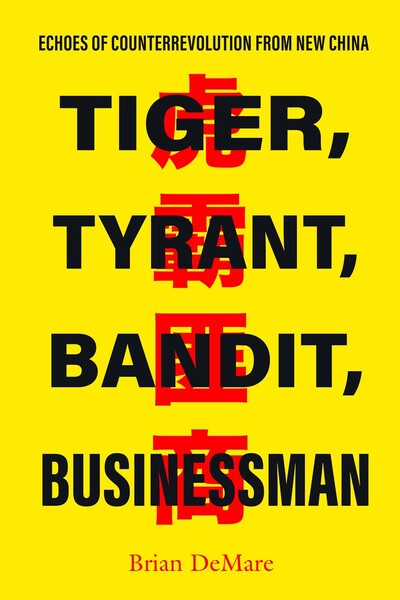
August 2022
208 pages.
from $30.00
Paperback now $15.00 (50% off)
Hardcover ISBN: 9781503632363
Paperback ISBN: 9781503640146
Ebook ISBN: 9781503632516
The rural county of Poyang, lying in northern Jiangxi Province, goes largely unmentioned in the annals of modern Chinese history. Yet records from the Public Security Bureau archive hold a treasure trove of data on the every day interactions between locals and the law. Drawing on these largely overlooked resources, Tiger, Tyrant, Bandit, Businessman follows four criminal cases that together uniquely illuminate the dawning years of the People's Republic.
Using a unique casefile approach, Brian DeMare recounts stories of a Confucian scholar who found himself allied with bandits and secret society members; a farmer who murdered a cadre; an evil tyrant who exploited religious traditions to avoid prosecution; and a merchant accused of a crime he did not commit. Each case is a tremendous tale, complete with memorable characters, plot twists, and drama. And while all depict the enemies of New China, each also reveals details of village life during this most pivotal moment of recent Chinese history. Together, the narratives bring rural regime change to life, illustrating how the Chinese Communist Party cemented its authority through mass political campaigns, careful legal investigations, and sheer patience. Balancing storytelling with historical inquiry, this book is at once a grassroots view of rural China's legal system and its application to apparent counterrevolutionaries, and a lesson in archival research itself.
About the author
Brian DeMare is Professor of History at Tulane University. He is the author of Land Wars: The Story of China's Agrarian Revolution (Stanford, 2019).
"Written in a lively and accessible style, each chapter presents a skillfully crafted and entertaining narrative of events triggered by the PRC party-state's efforts to intervene in one Chinese local society during the early 1950s. A valuable addition to the field."
—Micah Muscolino, University of California, San Diego
"Through masterful and transparent close readings of criminal cases from the Chinese countryside,Tiger, Tyrant, Bandit, Businessman models the practice of archival research as detective work. The book not only provides a lively portrait of a period and place in contemporary Chinese history, but also offers a marvelous introduction to the historian's craft for student researchers regardless of field."
—Tobie Meyer-Fong, Johns Hopkins University
"In this Le Carré-esquely titled gem, DeMare exploits a unique cache of criminal case files to document the impact that regime change had on the lives of four individuals suspected of 'counterrevolution.' Carefully crafted with an impressive capacity to develop narrative scope and intensity, the outcome is remarkable and riveting grassroots history at its best."
—Michael Schoenhals, Lund University
"Tiger, Tyrant, Bandit, Businessman portrays the establishment of CCP power in one part of rural China in vivid detail, while also introducing nonspecialist readers to the main features of rural Chinese society before and during the revolution.... It is a book that deserves to be widely read by all those interested in the Chinese revolution, whether specialists, students, or members of the public."
—Mark Czellér, The PRC History Review
"Tiger, Tyrant, Bandit, Businessman is an exemplary work of microhistory. By highlighting ordinary people's lived experiences in an insignificant place in southern China, the book provides a gripping account of the new PRC state's success in creating a new order at a critical juncture of modern Chinese history. As a well-written and thought-provoking book with a great deal of interesting and intriguing details, it will certainly appeal to any readers interested in Chinese history or trying to understand the seismic change in twentieth-century China."
—Qiliang He, Pacific Affairs